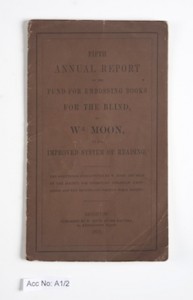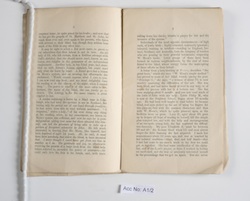Fifth Annual Report of the Fund for Embossing Books for the Blind, by William Moon, of the Improved System of Reading (Brighton: William Moon, 1853). Dimensions: 180 x 221 x 4mm (open)
RNIB Collection Acc No: A1/2.
Associated with the Home Teaching for the Blind Society and the Moon Society in Brighton, Moon promoted his system exhaustively and it was the most widely taught system in the 1870-80s, translated into 80 languages. Moon’s project was motivated by evangelical concerns: in his memoir he described at length his missionary travels across Europe and the circulation of the Bible in Moon type across different countries and continents. This report includes the testimonies of several blind readers expressing the ease with which they have learned Moon’s system and the pleasures of reading – particularly the bible – as a result.
Object Description:
This pamphlet is open on pages 6-7. Both pages consist of black text, justified to the left and right with the start of new paragraphs indented. The transcription is: ‘returned home, he quite pined for his books; and now that he has got the gospels of St. Matthew and St. John, he reads them over and over again to his parents, who listen with interest to their blind boy, though they seldom hear much of the Bible in any other way. [New paragraph] It may be right to select a few more cases, to prove to our subscribers that their labour is not in vain. An old lady of 69, who felt certain, from a fruitless attempt with Gall’s alphabet, that she should never read, learnt in one lesson; and delights in the possession of an independent employment. Another lady, in her 82nd year, had stumbled on with Alston’s Roman alphabet, but could read only what she knew by heart. A friend gave her a lesson on Moon’s system, and on meeting her afterwards she exclaimed, “Words cannot express what I owe to you. I can now read any book; and my most delightful time for reading is in the silence of the night, when I cannot sleep.” The power to read is of the more value to her, because, like many of the blind, she can rarely go to church. The Liturgy is, for the same reason, a great comfort to her. [New paragraph] A similar testimony is borne by a blind man in Edinburgh, who had tried the systems in use in Scotland, but having only the partial use of one hand through paralysis, he had never been able to read without assistance. “I despaired,” writes a lady, “of his ever doing any thing at the reading, when, to my amazement, one lesson on Moon’s system was sufficient, and now he says he is quite independent, adding that none but those situated like himself, can tell the pleasure of being able to take up a portion of scripture whenever he likes. He felt much interested in hearing that Mr. Moon, like himself, had been deprived of sight 14 years. Ah, he said, it must have been somebody that KNEW the blind, to have invented that. I never thought I could have got from one line to another as I do. His gratitude and joy, on afterwards receiving the present of a large book from the blind lady before referred to, exceeded the power of utterance—he could only hide his face in his hands, and, with tears [end of page 6] rolling down his cheeks, breath a prayer for her and the inventor of the system.” [New paragraph] Individuals of the most opposite circumstances—of high rank, of lowly birth; highly educated, extremely ignorant; talented, wanting in intellect—residing in England, Ireland, Scotland, and Australia, form the company of readers who are pouring in their grateful testimonies respecting W. Moon’s books. Little groups of these have been informed in various neighbourhoods, by the zeal of some of the blind, whose energy forms the main-spring of these efforts on their behalf. [New paragraph] A letter from a lady residing at F—, describes “the great boon,” which she says “W. Moon’s simple method” has proved to some of her blind friends among the poor. “Penelope G.” she says, “a woman of about 70, is now steadily mastering the difficulties of the art. She was born blind, and had never learnt to read in any way, so of course the process with her is a tedious one. She has been studying about 6 months, and can now read much of the 14th of John with my help. Little Philip M., who is now at the Brighton School, began about 10 months ago. He had been well taught to read before he became blind, and soon picked up the art of using his fingers for this purpose, first with the common characters and then with W. Moon’s, which he quite pounced upon, as the facilities were so great. Lucy R., aged about 60, gave up in despair all hope of reading to herself, till this simple plan tempted her, and with the help and encouragement of an energetic young lady, she has mastered the difficulties famously. My poor Elizabeth E., must be between 30 and 40; she became blind when 13, and soon almost forgot the little learning she had acquired. I made her acquaintance about 12 years ago, and was so touched by her isolated condition—blind, deaf, and half dumb—that I had her come to me once a week to try how we could get on together. She had some recollections of the alphabet, and of the Lord’s prayer, so these I worked in bobbin on the cardboard, and she was so anxiously interested herself in the proceedings that we got on apace. But she never’ [end transcription]

